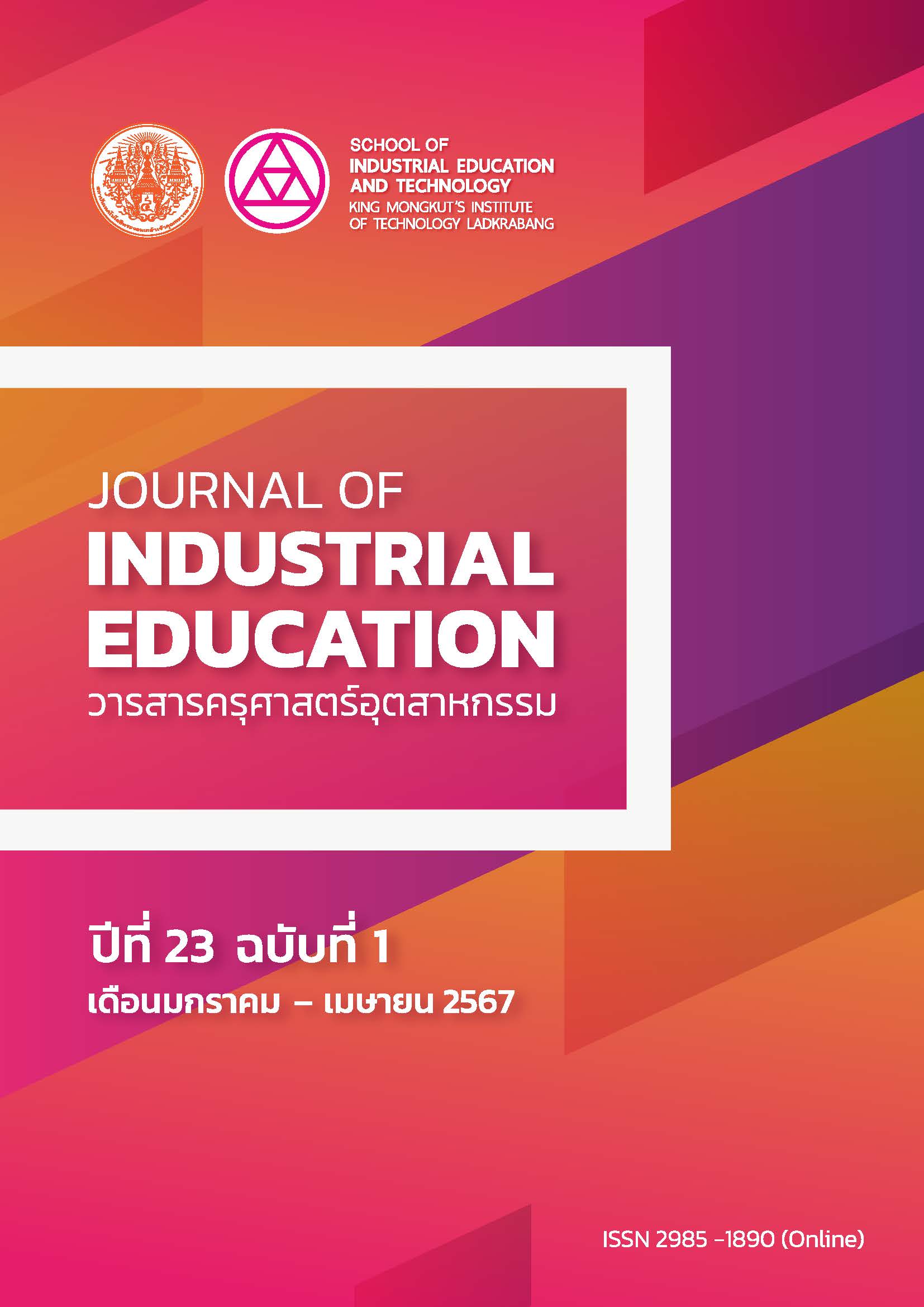IMPROVING ACADEMIC ACHIEVEMENT IN A SCIENCE AND TECHNOLOGY COURSE USING STAD COOPERATIVE LEARNING FOR EIGHTH GRADE STUDENTS
DOI:
https://doi.org/10.55003/JIE.23104Keywords:
Achievement, Cooperative learning management, Proactive learning management, Classroom action researchAbstract
This classroom action research demonstrates that the performance of eighth-grade students in science and technology courses using the STAD technique-based cooperative learning management was enhance to achieve a minimum of 70% and this technique yielded highest students' satisfaction. The sample group consists of 37 eighth-grade students from a school in Sakon Nakhon Province during the first semester of the academic year 2022, selected using purposive sampling. The research tools include a learning management plan, a 20-item multiple-choice achievement test on the topic of fluid, and a learning satisfaction form. The data analysis was based on averages, standard deviations, and percentages. The results show that students who were taught using the STAD technique-based cooperative learning management achieved an average score of 15.35 with a standard deviation of 2.07, exceeding the 70% success rate. The students expressed high levels of satisfaction with the STAD technique-based cooperative learning management, with an average overall satisfaction score of 4.42, and the highest satisfaction was reported for "teaching and learning activities" with an average score of 4.43.
References
Chatsupakul, S. (2007). Comparisons of effects of STAD colloborative learning approach and conventional learning approach to higher-ordered thinking and communication skills of Matthayomsueksa 1 students [Master’s thesis]. Mahasarakham University. (in Thai)
Iam-Chaengpham, A. (2004). The effects of oraganization of learning-teaching activities by using the cooperative learning model entitled “equations and inequalities, ration and percentages” on desirable characteristics and learning achievement of Matthayomsuksa 2 students at Ban Na Loeng School Amphoe Muang Nong Bua Lamphu under the Office of Nong Bua Lamphu education at zone 1 [Master’s thesis]. Mahasarakham University. (in Thai)
Institute for the Promotion of Teaching Science and Technology. (2003). Basic Learning Teacher's Guide Substances and their properties. Author. (in Thai)
Institute for the Promotion of Teaching Science and Technology. (2004). Basic learning teacher's guide force and motion energy. Author. (in Thai)
Kemmis, S., McTaggart, R., & Nixon, R. (2014). The action research planner: Doing critical participatory action research. Springer.
Khamsingnok, P. (2007). A comparision of learning outcomes entitled calculation for substance quantities in chemical reactions of the science content group of Matthayomsuksa 4 between instruction using TGT technique and STAD technique [Master’s thesis]. Mahasarakham University. (in Thai)
Mamonto, F., Umar, M. K., & Paramata, D. D. (2021). Pengembangan perangkat pembelajaran ipa smp menggunakan model pembelajaran kooperatif tipe Student Teams Achievement Divisions (STAD) bagi siswa berkebutuhan khusus. Jambura Physics Journal, 3(1), 54-63.
Nath, L. R., Ross, S., & Smith, L. (1996). A case study of implementing a cooperative learning program in an inner-city school. The Journal of Experimental Education, 64(2), 117-136.
Photipalakorn, A. (2002). The development of mathematics learning packages emphasizing mathematical problem solving skills by cooperative learning for Mathayom Suksa III [Master’s thesis]. Srinakharinwirot University. (in Thai)
Rachapakdee, S. (2007). Effects of studying by using computer courseware with two co-operative learning techniques: STAD technique and TGT technique [Master’s thesis]. Mahasarakham University. (in Thai)
Srimukda, J., Klangprapan, M., & Phrajit, S. (2015). Effects of the learning application using project-base approach in conjunction with thestad cooperative learning ofmathematical affecting learning achievements, problem solving abilities andlearning satisfaction of Prathomsuksa 6 students. Graduate Studies Journal, 12(59), 31-40. (in Thai)
Sukhawong, S. (1994). Comparison of learning achievement. group work behavior and persistence in learning of Mathayomsuksa 1 students learning social studies with project-based teaching using cooperative learning [Master’s thesis]. Srinakharinwirot University. (in Thai)
Tepsuribun, P., Nuankaew, J., & Liumthong, S. (2019). Development of science creative thinking in the topic of biodiversity of Mathayom Suksa 3 students learning under the 5E inquiry cycle learning management together with the 4 MAT technique. STOU Education Journal, 12(1), 168-177. (in Thai)
Downloads
Published
How to Cite
Issue
Section
License
Copyright (c) 2024 Journal of Industrial Education

This work is licensed under a Creative Commons Attribution-NonCommercial-NoDerivatives 4.0 International License.
"The opinions and contents including the words in papers are responsibility by the authors."
"ข้อคิดเห็น เนื้อหา รวมทั้งการใช้ภาษาในบทความถือเป็นความรับผิดชอบของผู้เขียน"



